I’m pleased the share the latest batch of fiction and nonfiction books with environmental themes…
Footprint: Four Itineraries
By Radhika Subramaniam
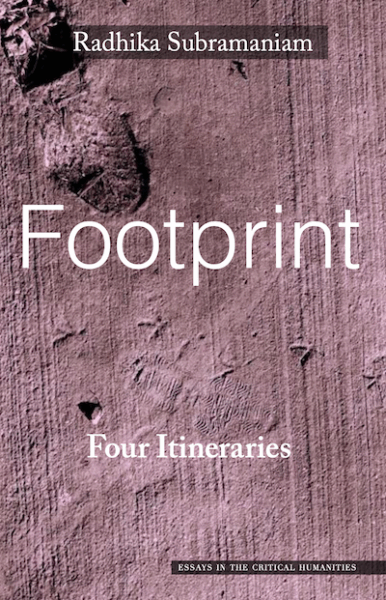
The book takes the footprint for a walk—to the Himalayas, the American southwest, to Arnhem Land and the moon, through monuments, prehistoric sites, sidewalks, and paintings, alongside artists, cartographers, surveyors and trackers, hesitating at revolutionary debate and solitary reverie, waylaid by war and land claims, sniffing greed and curiosity, recognizing both falter and fit, moving stealthily and boldly—to test the lasting power of this very material metaphor.
It probes the long history of the footprint’s manifestation in the human imagination—as mobility and occupation, inquiry and imperialism, absence and presence, trace, and impact. As a metaphor, it is ubiquitous and oddly self-evident. Four itineraries trace the contradictory forensic evidence offered by the footprint’s many appearances. How can that dreamy print of your sole in the sand also signify that the planet is dying? When did a lithe mobile residue become a leaden artifact? Stories of footprints testify to colonialism, imperialism, and suppression but woven through them are histories of desire, persistence, mobility, and of lightness. In taking you on a series of journeys to understand why and what it means for our future, the book asks if it is yet possible to tread lightly on our world.
Aegolius Creek
By Micah Thorp
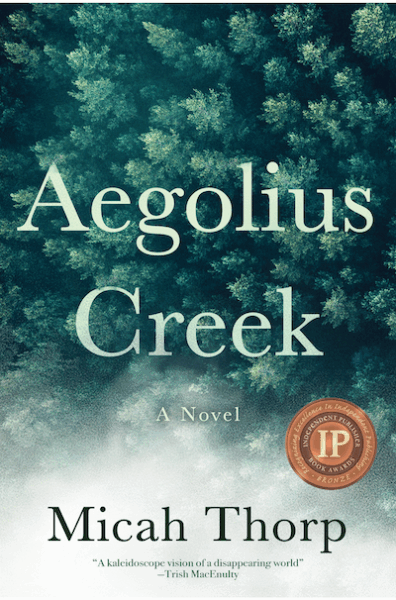
Don Karlsson has lived on his family’s Oregon homestead for most of his life. The timber on his land is his greatest asset—planted and replenished by his hand, maintained with his labor and sweat, and harvested for income at his discretion.
After a new species of voles is discovered living in those trees, authorities step in to protect the creatures, and Karlsson fights back. He enlists the help of his children: Billy, a local who understands his connection to the land; Stacy, an attorney from Boston determined to represent her father’s interests—even if they go against her own; and beloved and sensitive Zeke, who organizes local environmentalists to make sure his father does not win.
The impending confrontation engulfs the community and competing interests—local businesses and political groups, infiltrators seeking profit—with the Karlsson family at the center, still trying to reconcile the loss of Don’s wife and their mother, Marlene. Tempers flare, desperate acts are taken, and the courtroom battle spills over into protests and riots, leading to a riveting and stunning conclusion.
Wedding of the Foxes
By Katherine Larson
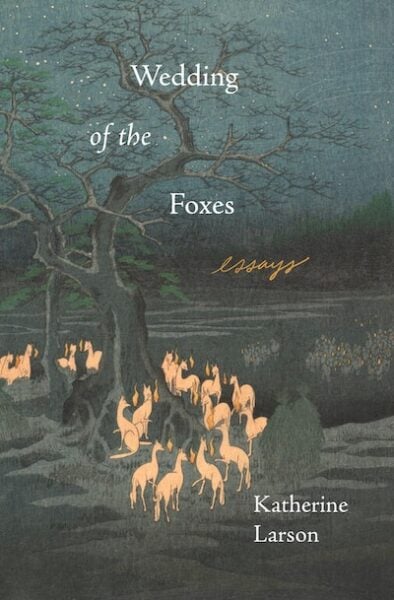
From Katherine Larson—Yale Younger Poet, teacher, and ecologist—Wedding of the Foxes is a luminous exploration of how to live meaningfully in the shadow of the climate crisis. Blending science, lyric essay, and memoir, Larson turns to the Japanese art of kintsugi—repairing broken pottery with gold—as a guiding metaphor for finding beauty in fracture. Through encounters with sandhill cranes, meditations on shrinking bird populations, and dialogues with thinkers and artists from Susan Sontag to Tawada Yōko, she traces the fragile yet dazzling connections between species, cultures, and moments in time. The result is a work that transforms ecological grief into an urgent call for resilience, mindfulness, and wonder.
Blue
By Elijah McKenzie-Jackson

Blue is an extended essay by Gen Z activist and artist Elijah McKenzie‑Jackson that draws on personal experiences activism and art to explore climate justice, LGBTQ+ rights, and mental health. The book encourages readers to embrace their authenticity and take action for environmental and social change.
Kinship Medicine: Cultivating Interdependence to Heal the Earth and Ourselves
By Wendy Johnson MD MPH
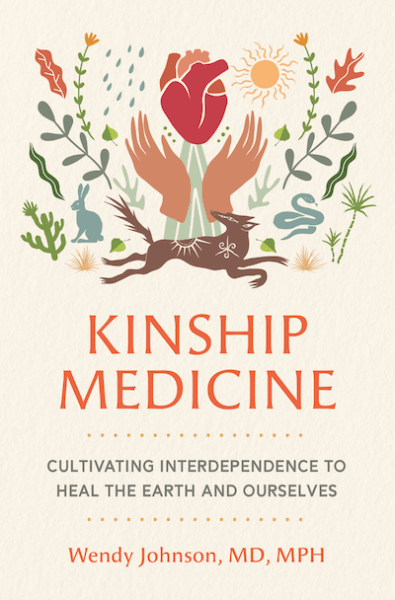
Our modern way of living is incompatible with our survival. Most of us intuitively know this truth, but almost everything in our society encourages us to ignore it. Dr. Wendy Johnson confronts this undeniable fact and breaks down how we think and act every day in ways that undermine our individual and collective well-being.
The antidotes to many of the causal factors of poor health—loneliness, industrial diets, systemic inequality, fear of death, profit-based healthcare—are relational, with each other and with the living earth. The reader will leave with a clear vision of what a new society might look like, methods to accomplish this transformation, and concrete examples of where it is being done successfully.
Incident at Cougar Creek
By Mary Flodin
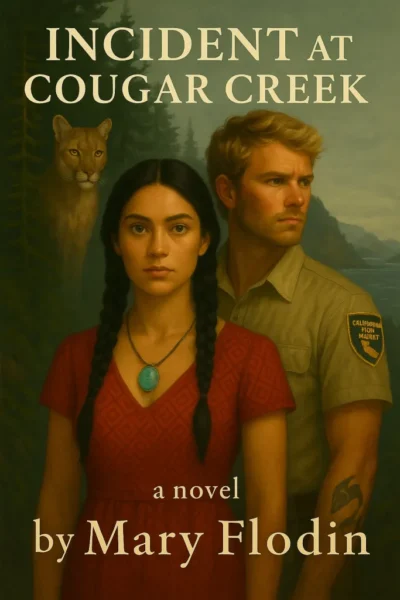
In a land where nature is unraveling, a brutal murder and a supernatural secret bring together Fish and Wildlife Officer Colin Dawson —an Army Ranger veteran struggling with PTSD—and Kumeyaay Native Delfina Cuero. Will Colin and Delfina be able to rise above their personal wounds in time to stop the monster who killed Delfina’s mother and threatens their sacred land?
From Central California’s Cougar Creek Coast Ranch National Monument — one of the most sensitive biodiversity hotspots in North America — comes a mystery at the intersection of eco-thriller and romantasy, positing the fantastical question: Can mutations in epigenetic DNA activated by the recent wave of climate havoc-induced pandemics turn humans into shape shifters?
Walking Chicago’s Coast: A 63-Mile Journey to the Indiana Dunes
By Michael McColly
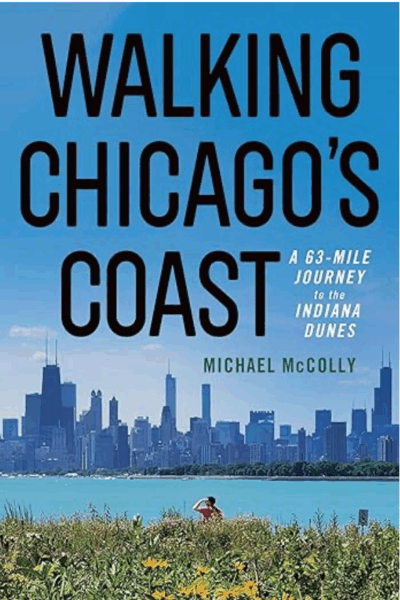
Blending travelogue, memoir, and environmental reportage, Walking Chicago’s Coast takes readers on an urban journey. Michael McColly begins his walk at his far–North Side Chicago apartment and proceeds for two long days along the shore of Lake Michigan to the Indiana Dunes National Park. As he walks, McColly reflects on the layers of history, the constructed magnificence, and the troubling divides in this polyglot mecca of the Midwest.
From its descriptions of grand parks and architecture to packed sandy beaches to polluted neighborhoods called “sacrifice zones” along industrial waterways and rivers, Walking Chicago’s Coast shows how such urban hiking lets one contemplate a city’s grandeur and history, confront environmental and social realities, and trigger emotions and memories. Through Superfund sites, brownfields, scrapyards, and industrial ruins, McColly discovers the remarkable patterns of urban nature and the surprising beauty along his path.
John is co-author, with Midge Raymond, of the mystery Devils Island. He is also author of the novels The Tourist Trail and Where Oceans Hide Their Dead. Co-founder of Ashland Creek Press and editor of Writing for Animals (also now a writing program). More at JohnYunker.com.
